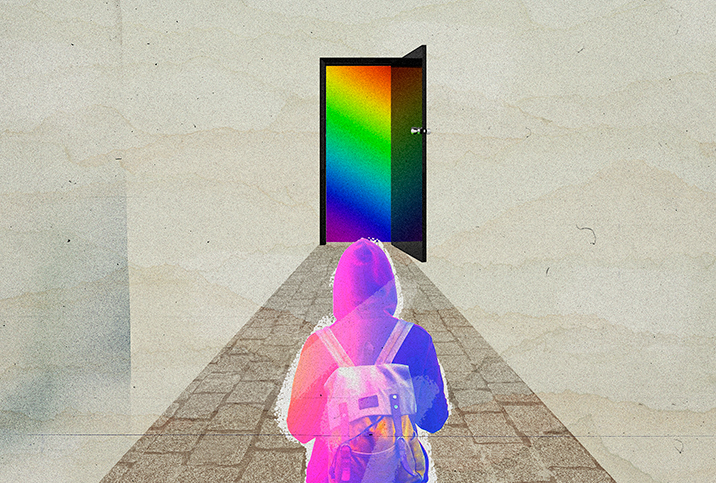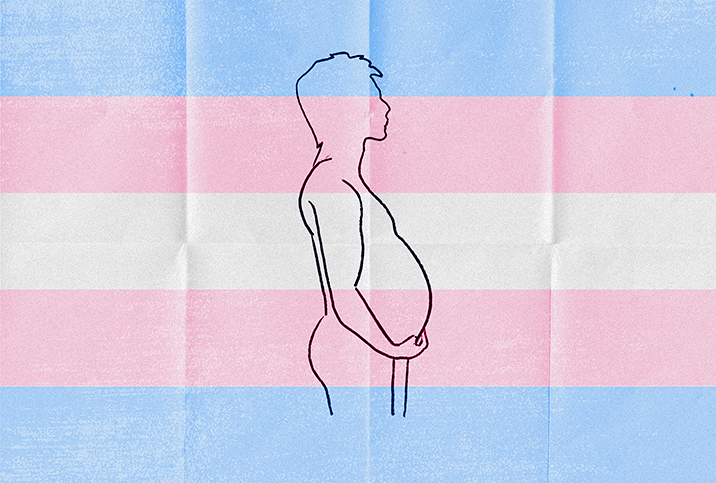Trans Prisoners Are Fighting for Access to Hormones

One morning, Jessica Hicklin woke up in her Missouri prison cell to the news that her fellow inmate had almost died.
"My friend was on hormones when she came to prison, and they stopped her access," Hicklin said via Zoom. "The only way she could try and stop the testosterone in her body was to try and castrate herself. She did it with a pair of toenail clippers, which is horrific. They found her laid on the floor of her cell, having bled out."
Now 42 years old, Hicklin has been a free woman for just a few months. She had been an imprisoned man for much of her life. Sentenced to life without parole for murder, she entered prison when she was just 16. Hicklin was sexually assaulted early into her sentence and placed in solitary confinement for fighting off her assailants. At 21, Hicklin came out of confinement and stepped into a job as a law clerk for death row prisoners, she recalled.
"Whenever death warrants were issued and execution dates were set, they would be put into protective custody," Hicklin said. "I was the sole access to the law library for people who were scheduled to die. You can't make yourself ready for that."
Those years she spent familiarizing herself with the law proved invaluable when Hicklin came out as transgender at 36 years old.
"I just flagged down a therapist and said I wanted to be evaluated for gender dysphoria," said Hicklin, laughing at her memory of the therapist's reaction. "She was like, 'Wow, that's definitely not a normal request for therapists to get!'"
The therapist was supportive and quickly referred Hicklin to a psychiatrist for a diagnosis of gender dysphoria, which was necessary to access hormone treatment.
It was here that the real battle began.
Trans prisoners face countless obstacles
Despite a landmark 2011 legal victory identifying "freeze-frame" policies as unconstitutional, Hicklin's Missouri prison still had one in place. These policies ensure trans prisoners can only access hormone therapy if they were prescribed it before being incarcerated. Illicit use of hormones doesn't count, which is why Hicklin's friend nearly bled to death.
Yet wider access to trans health care is often abysmal too, fraught with gatekeeping and endless barriers. As a result, black market hormones are a last-ditch attempt for many people in need.
There's little data on how many states still enact freeze-frame policies, but hormone access is just one part of a much bigger picture. Trans prisoners are routinely harassed, mistreated and overwhelmingly placed in prisons that don't match their gender. According to an NBC News investigation, just 15 trans people in the United States are housed according to their correct gender. After release, transphobia exacerbates the already huge financial and mental burdens of reintegration into society.
Hicklin became determined to fight the freeze-frame policy legally, which was far from an easy task.
"I requested hormone access, and one of the middle-tier administrators from the Missouri Department of Corrections literally wrote back, 'We don't do that,'" she recalled.
The administrator cited the freeze-frame policy and, to rub salt in the wound, misgendered Hicklin in the response.
"They told me I was free to legislate," she added, a smile on her face. "I was like, 'Yeah, I sure as hell will!'"
Battles for access are rarely won alone
Activist Dominique Morgan, now executive director of the Okra Project, a grassroots collective that provides vital resources to Black trans women, knows just how difficult these fights can be. Morgan was formerly incarcerated. In 2017, she became executive director of Black & Pink, a prison abolitionist organization that fights for the rights, care and dignity of LGBTQIA+ prisoners.
"In prison, it's hell for you to even get an allergy pill or medication when your tummy is upset," she explained. "Imagine then what it takes for you to gain access to gender-affirming care, in the myriad of ways that can manifest."
Almost always, these fights aren't won alone.
"You need a dream team of people," Morgan said. "And we're not talking systemic change here; you need that team for even one person to get access."
Hicklin did enlist the help of Lambda Legal, which offers free legal aid to LGBTQIA+ and HIV-positive people. The organization continues to advocate for trans prisoners. In 2021, Lambda filed a federal lawsuit against the Virginia Department of Corrections on behalf of Jason Yoakam, an incarcerated trans man denied access to gender-affirming surgeries and mental healthcare treatment.
In the case of Hicklin, decades of experience in the law library paid dividends. Yet despite her extensive knowledge of the prison system, she was nervous during the process.
"I used to have weekly strategy phone calls with my attorneys, who were amazing," Hicklin said. "Early on, we had a conversation about what we wanted to achieve with this case. It's one thing to get the access I need, run away into the corner and think, 'Screw everyone else.' There was also the fear of pushing so hard that we'd lose and end up hurting people in the process."
A victory for one can be a victory for many
If they were to lose the case, it could become a legal precedent weaponized against future trans prisoners. Hicklin's case dragged on for years.
"I was very aware that we were fighting not only for my rights, [but also] for the rights of other trans women," she said.
When Missouri's Department of Corrections sensed Hicklin might win, they offered her an out: She could have access, but nobody else could.
"I couldn't accept that," she recalled, emotional at the memory. "I couldn't run off into a corner and watch my friends die of the same thing that was killing me."
It took six months of additional litigation, but Hicklin won, and in 2018, Missouri overturned the freeze-frame policy.
These fights continue, often behind closed doors. Trans rights are built on beds of sand: They're far from concrete, and the rate at which new anti-trans bills are proposed nationwide is relentless.
"There's this idea that if oppressed people get one good thing, we have to take something else away from them," Morgan explained. "The girls on the inside know that if they fight for gender-affirming health care or change of markers and they win, that's going to have a domino effect on other things that they don't want to change."
Hormone access remains unsettled nationwide, not just in prisons. In May 2022, Alabama legislators made headlines for passing a bill that would criminalize access to gender-affirming care for minors. A judge blocked a part of the law that made it a felony, but it was a huge blow for trans rights nevertheless. These rulings impact trans health care in prisons, too. In the case of freeze-frame policies, lack of access outside translates to lack of access inside.
The likes of Morgan and Hicklin continue to advocate for these rights and for justice more broadly. Morgan fights tirelessly for Black trans women, in particular, ensuring they have food, housing and community support.
Hicklin, who gained her release because of a Supreme Court ruling, is now chief technology officer at Unlocked Labs, which grants education access to prisoners. As she spoke about her case, she was set to travel to a prison facility the next day to set up a coding class.
"My life is beautiful, but it's always been dutiful," she said. "I'm sorry to everyone I've hurt along the way, but I realized I could either be crushed by fear and depression or I could fight back against injustice. I don't think I know how not to fight back."


















